Dead End Geek.
 Saturday, March 1, 2014 at 11:08PM
Saturday, March 1, 2014 at 11:08PM 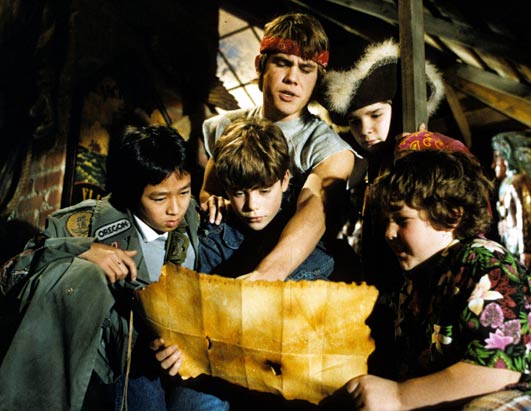 These guys aren't dead end. These guys are unstoppable.So, finally got around to watching World’s End. What a brilliant premise, and weren’t there some great moments. And yet I switched it off with a familiar feeling of disappointment.
These guys aren't dead end. These guys are unstoppable.So, finally got around to watching World’s End. What a brilliant premise, and weren’t there some great moments. And yet I switched it off with a familiar feeling of disappointment.
‘Why, Matt?’ I hear you ask, your eyes lighting up like a child’s on Christmas morning.
Well, I think it comes down to the epilogue. You know, that bit where Pegg’s protagonist fulfils his lost boys fantasy of arrested development by teaming up with the changeless eighteen-year old replicants of his old friends and abandoning reality forever? As an ending, this not only made no sense, it flatly contradicted the entire rationale of the character that the film had spent the previous hour and a half establishing.
Remember, this is a guy who has spent all but the first few scenes of the film battling legions of body-snatching aliens – as well as his own unthinking narcissism – in a desperate bid to save humanity. So how can Pegg and Wright serve up a parting shot which leaves us thinking that the same character would be happy to spend the rest of his days going from pub to ruined pub asserting alien rights in a series of bloodthirsty, implicitly murderous skirmishes with his fellow humans?
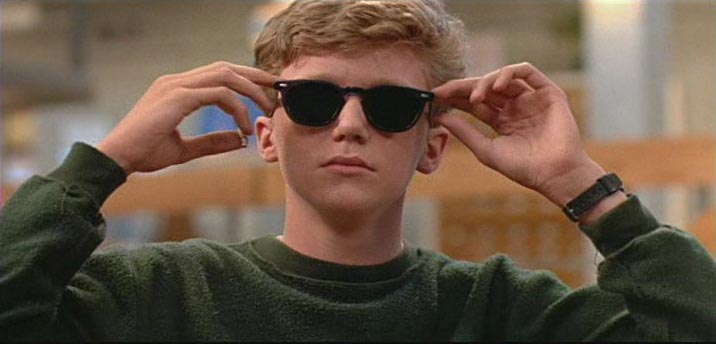 'Chicks cannot hold their smoke. Dat's what it is.'That’s a wet, ontologically bereft fart of an ending. The only conceivable reason for the directors to have done it is because they thought it would look cool. Yay, they’ve restored the hero to his hometown and his replicant buddies who never change or grow old. Don’t worry if that sounds like a living hell or makes the entire rest of the film meaningless, because they’ve all got super-awesome weapons and flashy eyes and stuff. Double yay!
'Chicks cannot hold their smoke. Dat's what it is.'That’s a wet, ontologically bereft fart of an ending. The only conceivable reason for the directors to have done it is because they thought it would look cool. Yay, they’ve restored the hero to his hometown and his replicant buddies who never change or grow old. Don’t worry if that sounds like a living hell or makes the entire rest of the film meaningless, because they’ve all got super-awesome weapons and flashy eyes and stuff. Double yay!
As a reversal it’s empty, and the worst part is that this emptiness reflects back across the rest of the film, subverting the fragile physics of character and story that any work of fiction labours to create and preserve by remaining psychologically or narratologically consistent.
I have decided to fight back against this phenomenon – because make no mistake, it is a phenomenon – and the first step in what I expect to be a global resistance movement against shoddy writing is to give the condition a name and anatomise its symptoms. I have therefore decided to call this tendency the problem of the geek.
The problem of the geek, in a nutshell, is whatever happens when filmmakers do something because they think it will look cool, and damn the consequences for things like psychological realism or suspension of disbelief.
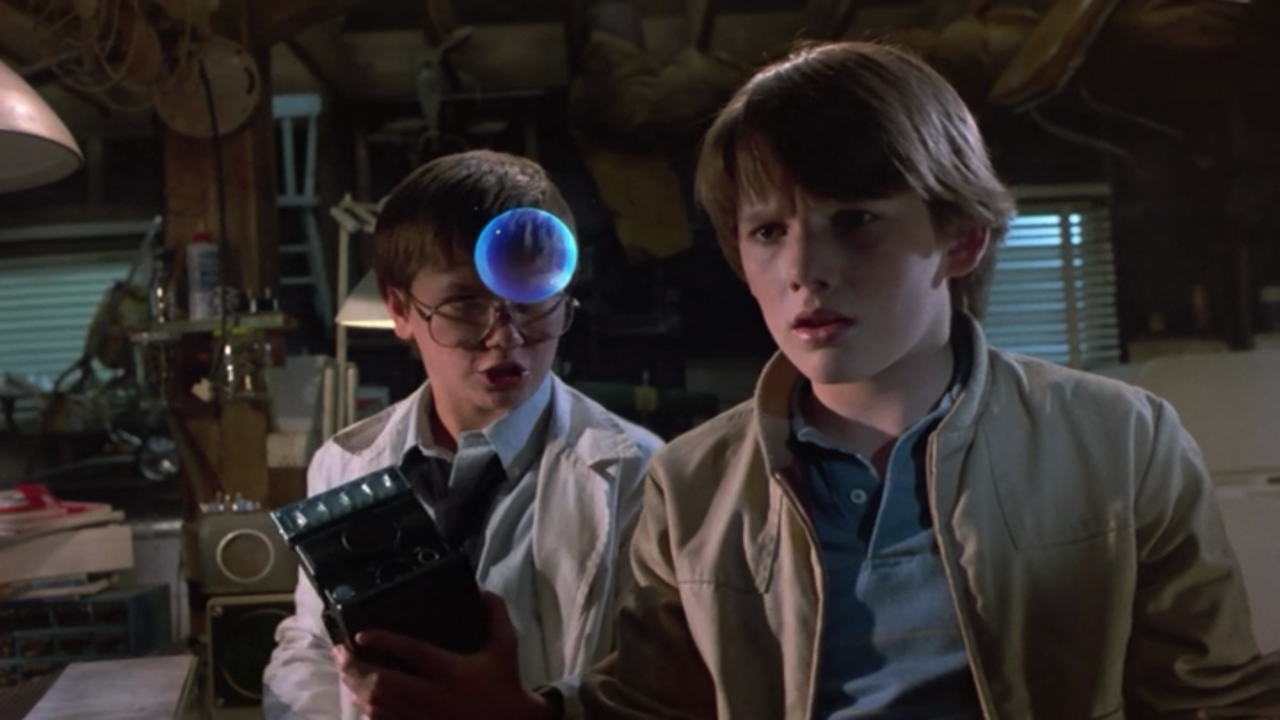 'This breakthrough will totally allow me to cop off with an alien.'The first film in which I noticed the phenomenon was Tarantino’s Inglourious Basterds. In that, Tarantino spent the first half-hour blowing everyone’s mind with a suspenseful, masterly game of cat-and-mouse led by Christoph Waltz’s terrifying SS Colonel. Wow, I remember thinking, Tarantino is doing Tarantino in the Second World War. Now that’s new.
'This breakthrough will totally allow me to cop off with an alien.'The first film in which I noticed the phenomenon was Tarantino’s Inglourious Basterds. In that, Tarantino spent the first half-hour blowing everyone’s mind with a suspenseful, masterly game of cat-and-mouse led by Christoph Waltz’s terrifying SS Colonel. Wow, I remember thinking, Tarantino is doing Tarantino in the Second World War. Now that’s new.
But then, for me at least, he blew it. It quickly devolved into a fairly generic, cartoonishly violent revenge fantasy against the Nazis, which culminated in – horror of horrors – a scene where the plucky crew of renegades manages to kill Hitler.
Which didn’t bloody happen.
Now, I have no objection to alternate history fiction. I will always love Chabon’s The Yiddish Policeman’s Union with its doomed, ice-bound Jewish enclave in Sitka, Alaska. Nor is it even particularly original to focus the lens of alternate history on the Nazis: both Philip K Dick’s The Man in the High Castle and Thomas Harris’ Fatherland presuppose the Nazis winning the Second World War and then create great stories from deducing the world that would entail.
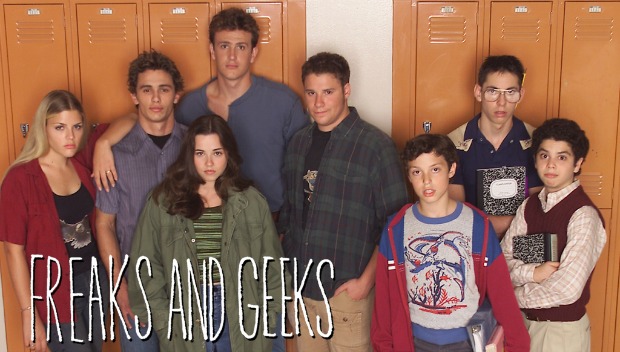 These guys know what I'm talking about.But there’s the rub: the divergence with historical fact in all three of those novels (including Chabon’s) comes at the beginning of the story. It provides the generative seed for a speculative fiction about what life would have been like if those bastards had won as opposed to the bastards we ended up backing.
These guys know what I'm talking about.But there’s the rub: the divergence with historical fact in all three of those novels (including Chabon’s) comes at the beginning of the story. It provides the generative seed for a speculative fiction about what life would have been like if those bastards had won as opposed to the bastards we ended up backing.
In Tarantino’s film, the breach with historical fact comes at the end, not the beginning. Killing Hitler at this point in the film changes nothing and adds nothing, because it has neither the power to affect any subsequent narrative (i.e. it’s not used as the stepping-off point for an alternate history), nor any power to retroactively enhance the preceding narrative. Because – and here, I think, is the key point – Brad Pitt’s dirty dozen would have been no less heroic if they had failed. Indeed, that would have given them a valedictory lustre reinforced by our knowledge that other brave peopled tried, and failed, to kill Hitler.
Killing Hitler at the end like that – in a theatrical orgy of violence, bullets and melting celluloid – is playground stuff. It exposes the director’s infantile desire for a heroic climax, a flashy coup-de-théâtre that looks cool yet which, as I’ve tried to establish, is devoid of any narrative mass within the created world of the film. It’s a masturbation fantasy of wish-fulfilment, in which Tarantino’s alter-ego doesn’t just sock old Adolf on the jaw, he actually kills him.
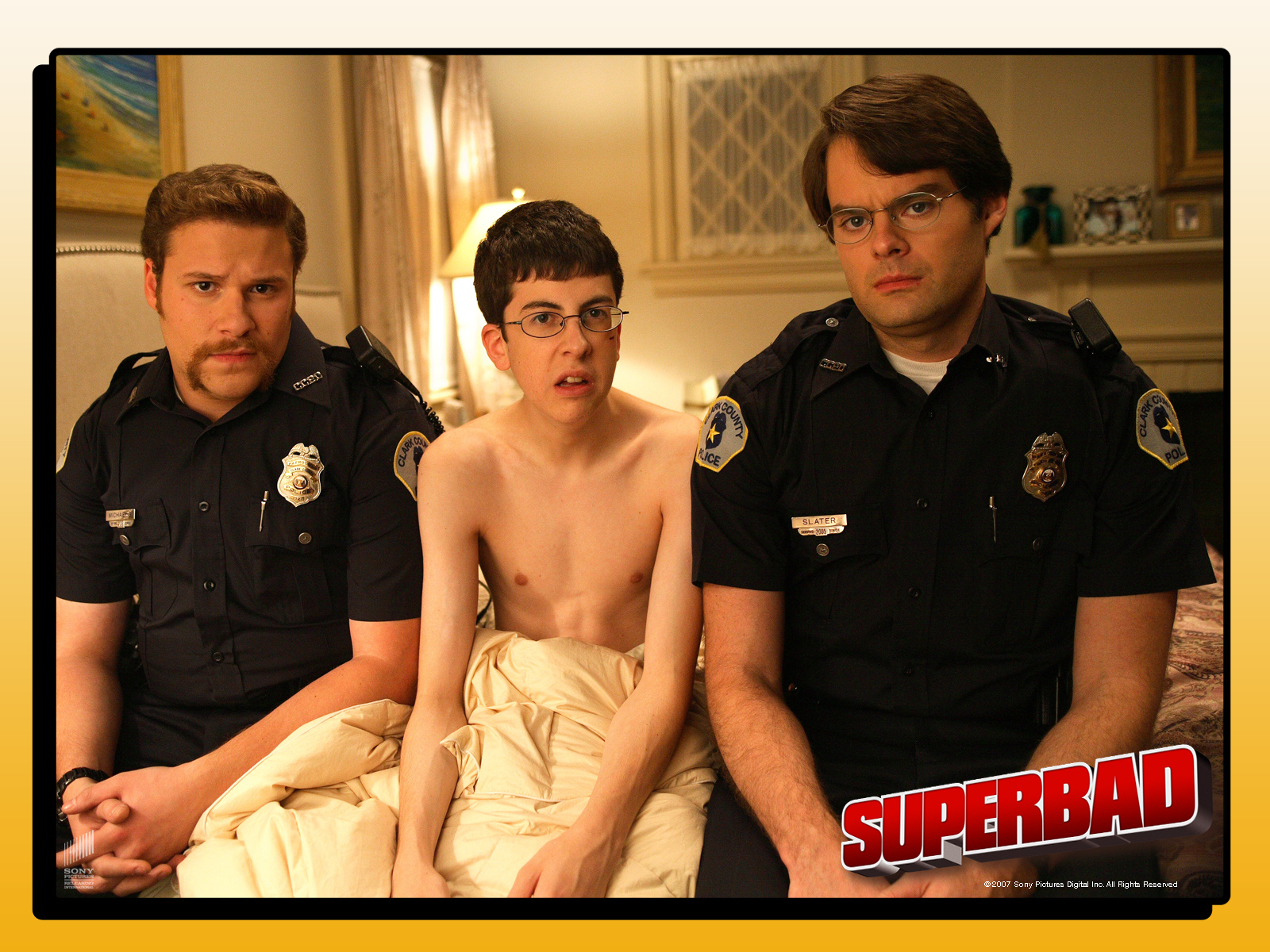 As does McLovin.This is pretty reprehensible stuff, because endings matter, and Hitler’s ending matters more than most. His demise, alone and desperate, over the poisoned body of his new wife is an ending we know and remember for a reason: because he was one of the twentieth-century’s greatest mass murderers, and because all the survivors and relatives of his victims, and all the people that fought against him in the Second World War or lost a loved one to the grinding jaws of that machine, have had that scene burned in their memory. All of them would have preferred a different ending, in which Hitler was brought to account for his actions, but they never got it. So why should Tarantino have the ending he wants, and have it so easily?
As does McLovin.This is pretty reprehensible stuff, because endings matter, and Hitler’s ending matters more than most. His demise, alone and desperate, over the poisoned body of his new wife is an ending we know and remember for a reason: because he was one of the twentieth-century’s greatest mass murderers, and because all the survivors and relatives of his victims, and all the people that fought against him in the Second World War or lost a loved one to the grinding jaws of that machine, have had that scene burned in their memory. All of them would have preferred a different ending, in which Hitler was brought to account for his actions, but they never got it. So why should Tarantino have the ending he wants, and have it so easily?
There’s a lack of proper dramatic resolution to killing a cartoon Hitler, because you know he’s only paste and paper. The challenge in creating fiction about the Nazis, or any other factual monster, isn’t simply to gratify your lust for vengeance by bludgeoning historical fact to suit your heroic agenda. The challenge is to find a weak point in the chronology where you can plant the seed of a story and construct your own precarious, plausible rat-run through the known events, and maybe, just maybe, offer a limited prospect of escape and hope at the end of it.
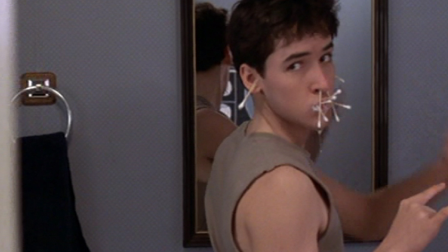 And so does young John Cusack.Jesus Christ, even Captain America treated the Second World War with more respect. At least they threw in a couple of historical facts to add context and a sense of historicity (e.g. Hitler’s fascination with the Occult, the pressure to enlist) and then had the decency to go away and spin a separate, completely bonkers universe from that starting point.
And so does young John Cusack.Jesus Christ, even Captain America treated the Second World War with more respect. At least they threw in a couple of historical facts to add context and a sense of historicity (e.g. Hitler’s fascination with the Occult, the pressure to enlist) and then had the decency to go away and spin a separate, completely bonkers universe from that starting point.
There’s a similar problem with historical realism in Tarantino’s latest movie, Django Unchained. Once again, he adds a veneer of gravitas to his story by basing it on something putatively historical, in this case the practise of ‘mandingo’ fighting, i.e. hand to hand contests between slaves in the Confederate South. But there’s no historical evidence that mandingo fighting actually occurred, and certainly none that those contests were fought to the death (after all, why would slave-owners, who had an eye on profit, destroy their ‘property’?). Even the term mandingo is a product of Hollywood, specifically the 1975 film of that name.
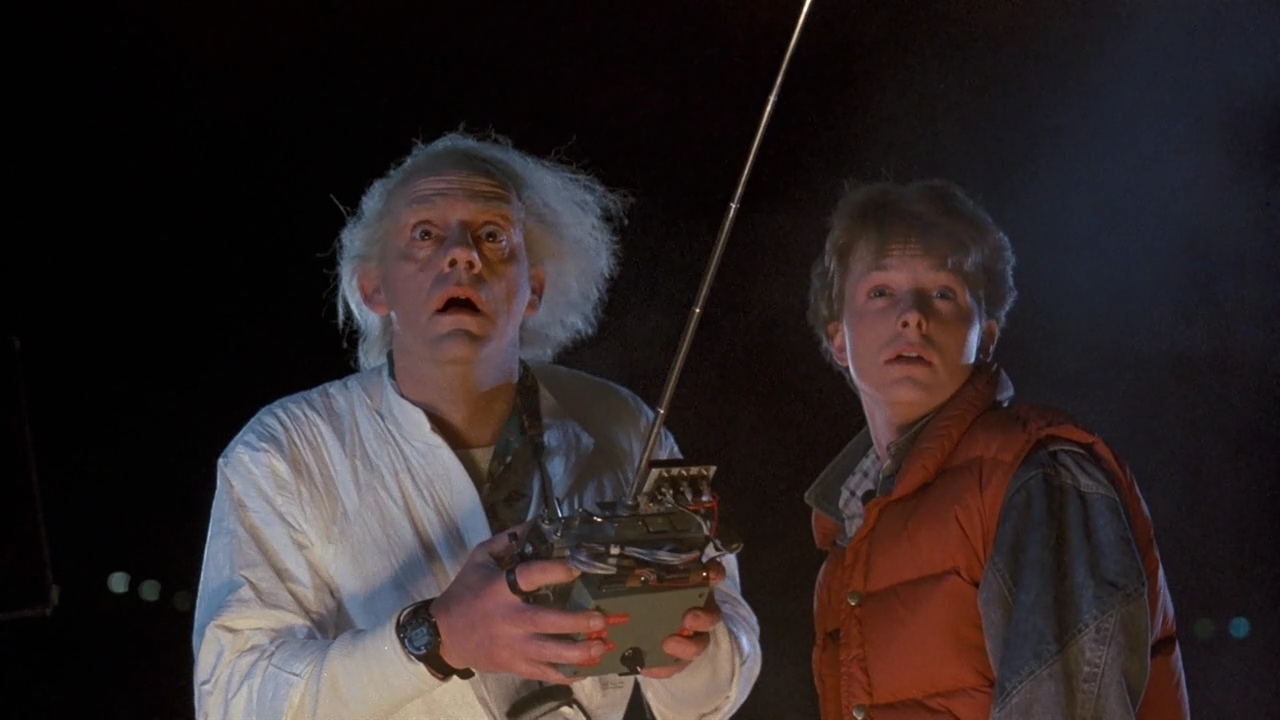 The career ambition of every geek: the mad professor.Does this matter? Christopher Caldwell in The Financial Times notes that: ‘Django uses slavery the way a pornographic film might use a nurses’ convention: as a pretext for what is really meant to entertain us. What is really meant to entertain us in Django is violence.’ This being the case – that is, it being the case that the filmmakers are well placed to fall back on the defence of providing entertainment for entertainment’s sake – does it matter that the historical facts have been either disregarded, exaggerated or traduced? Are we in a position to demand an ethical consciousness from a movie that’s meant to be just a bit of innocent fun?
The career ambition of every geek: the mad professor.Does this matter? Christopher Caldwell in The Financial Times notes that: ‘Django uses slavery the way a pornographic film might use a nurses’ convention: as a pretext for what is really meant to entertain us. What is really meant to entertain us in Django is violence.’ This being the case – that is, it being the case that the filmmakers are well placed to fall back on the defence of providing entertainment for entertainment’s sake – does it matter that the historical facts have been either disregarded, exaggerated or traduced? Are we in a position to demand an ethical consciousness from a movie that’s meant to be just a bit of innocent fun?
I’d say yes. Go back to the definition of the problem of the geek. I defined it as what happens whenever a filmmaker does something because it looks cool, and damn the consequences. Well, Tarantino undoubtedly thought it was cool to have a revenge story about a slave – and he’s right. It is pretty cool, not to mention righteous. Where he falls down is in thinking that it’s OK to obfuscate the historical facts and sensationalise the extent of violence as means of making his story even cooler. Because the moment you play it fast and loose with real historical material, you open yourself up either to trivialising the suffering of the descendants of slaves or reinforcing prejudice.
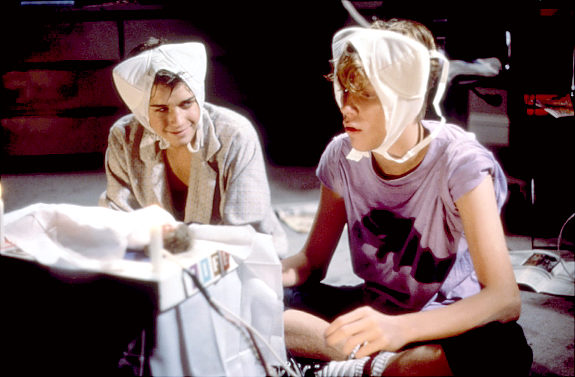 Scientific headgear.Is it a coincidence that both Tarantino and World’s End co-writer Simon Pegg spent their formative years working in, respectively, a video store and a comic-book shop? These guys are self-professed, card-carrying devotees not merely to media but also to genres within those media that, at their worst, have a tendency to privilege the fantastic over the real, the Manichean binaries of black and white over hazy grey moral uncertainty and the flip deus ex machina over the hard-won, limited consolations of philosophy.
Scientific headgear.Is it a coincidence that both Tarantino and World’s End co-writer Simon Pegg spent their formative years working in, respectively, a video store and a comic-book shop? These guys are self-professed, card-carrying devotees not merely to media but also to genres within those media that, at their worst, have a tendency to privilege the fantastic over the real, the Manichean binaries of black and white over hazy grey moral uncertainty and the flip deus ex machina over the hard-won, limited consolations of philosophy.
And yet, in all the best superhero stories, or fantasy epics or sci-fi or whatever, you nearly always find great power used as a metaphor to clarify our own attempts to have an effect in the real world. There’s a direct proportionality between the two parts of the analogy (they’re great heroes facing great adversity, we’re insignificant people facing essentially trivial, yet to us vital, struggles), and a symmetry of moral alignment that shows us how, when we tell stories about heroes, we are really talking about ourselves.
That’s why I see no fundamental difference between reading Virgil and sitting down to watch a contemporary Superhero movie or some well-made action flick. ‘I sing of arms and the man,’ Virgil wrote in the very first line of The Aeneid, and you can be pretty sure we’ve been making variations on that voiceover since the first story was ever told. It’s also why, when these genres get it right, they get it more transcendently, joyously right than almost any other type of storytelling: because they plug us in directly to our creation myths with a sense, however ephemerally, of being able and worthy of partaking in those narratives.
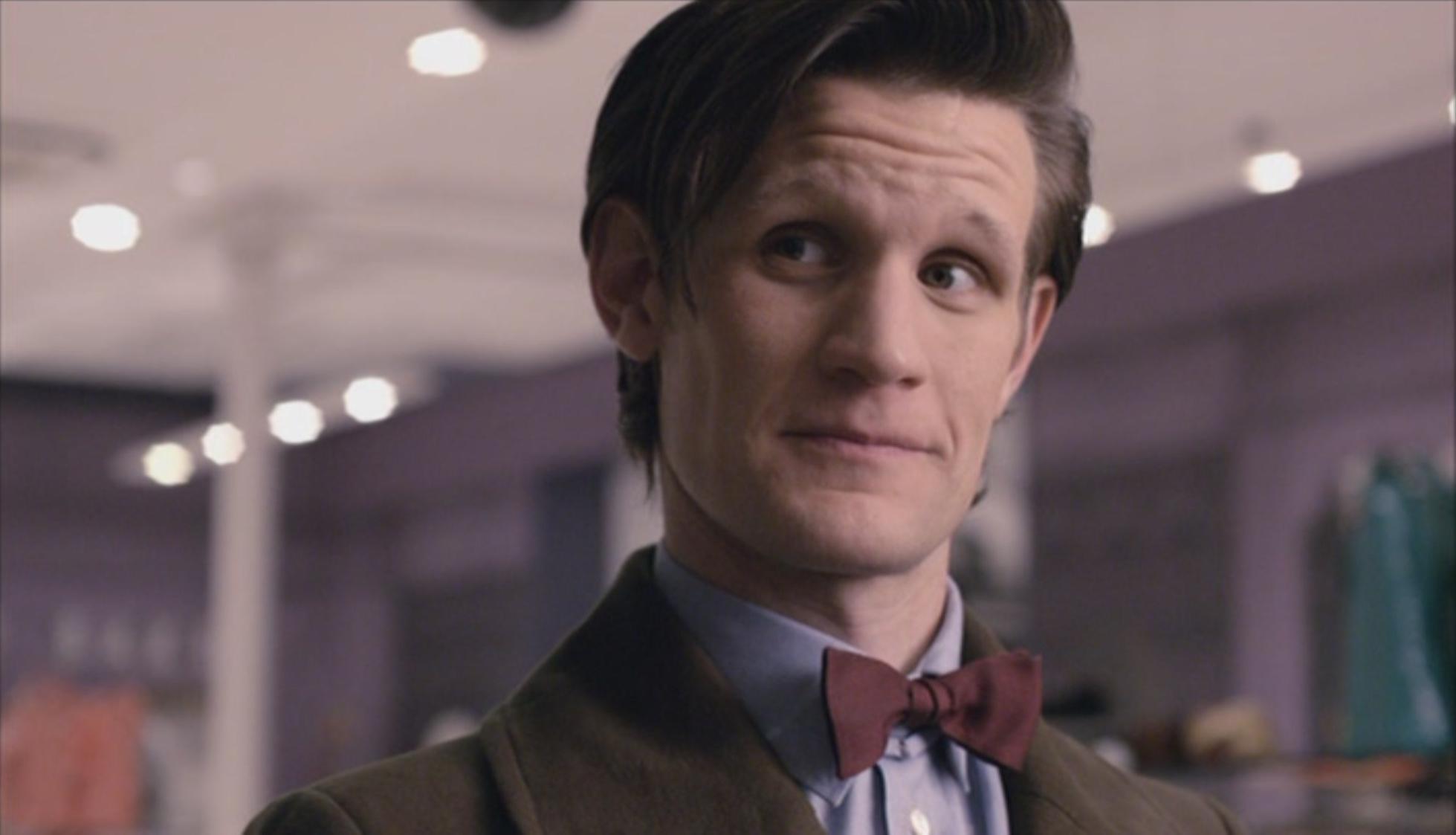 Bow ties are cool.
Bow ties are cool.
But for that alchemy to happen, a story needs to observe the basic precepts dictated by the form. Let’s be clear for a moment. People like Tarantino may call themselves innovators, but they’re not radical avant-gardists pioneering a new art-form. They’re telling a story about human beings, to human beings. As such, they should observe the basic rules of storytelling as established for that purpose – and that includes, as well as all that bullshit about three acts or the five stages of the hero’s journey, a certain internal cogency of characterisation, plausible psychological realism and a recognition that their audience aren’t fucking morons.
If they’d just stop to think about these aspects for a moment, they might shy away from allowing themselves to do something glib and flashy just because it replicates the cool archetypes that shaped their imaginations. Because you can bet that all those iconic scenes which they’ve memorised don’t owe their longevity simply to the immediate business of leaving a horse’s head in someone’s bed or chopping off someone’s hand with a lightsaber: those scenes endure because they’re the product of a meticulous, balanced projection of what a character can and would do within the prescribed confines of the story with this or that catalyst; the horse’s head establishes beyond question the ruthlessness of the man who put it there and the man in black is chopping off his own son’s hand. Nothing happens without a cause or an effect.
To sum up, the star of the geek is in the ascendant now. We watch movies about them, by them and for them. We worship them for becoming billionaires. We champion their attributes – misanthropy, physical weakness, mental acuity – where once we mocked them (the remake of 21 Jump Street riffed extensively on this reversal of values). And when we go to the cinema, we are subtly yet insistently reminded by the range of films on offer that we should enjoy the kinds of things boys aged 15-24 enjoy.
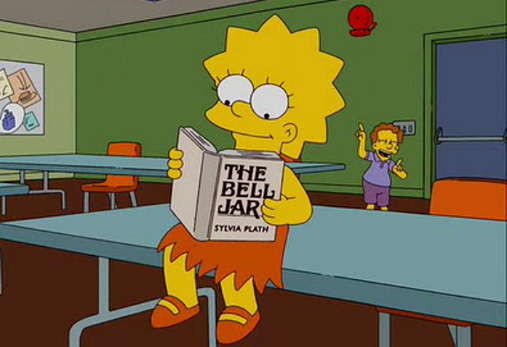 Her most serene and righteous majesty.And yet, hasn’t something been lost from this deification of the geek? Wasn’t the appeal of the character always that he or she was an outsider? That’s what gave the geek his pathos, his heart. John Hughes certainly understood that (but then he had a big heart), but so did dozens of other ‘Eighties movies like The Goonies (being a goonie was just a euphemism for being a geek), Explorers (River Phoenix’s prize turn as a dorky genius), Lucas, with Corey Haim’s eponymous entomological dreamer, George McFly in Back to the Future, Garth in Wayne’s World, Ray and Egon in Ghostbusters – and so on.
Her most serene and righteous majesty.And yet, hasn’t something been lost from this deification of the geek? Wasn’t the appeal of the character always that he or she was an outsider? That’s what gave the geek his pathos, his heart. John Hughes certainly understood that (but then he had a big heart), but so did dozens of other ‘Eighties movies like The Goonies (being a goonie was just a euphemism for being a geek), Explorers (River Phoenix’s prize turn as a dorky genius), Lucas, with Corey Haim’s eponymous entomological dreamer, George McFly in Back to the Future, Garth in Wayne’s World, Ray and Egon in Ghostbusters – and so on.
Now, however, people like Pegg and Tarantino have been invited in from the cold, and garlanded with all the laurels Caesar has to offer, and in the due course of things they seem to have forgotten how it felt to be on the outside. That’s assuming they ever really knew, because one of the troubling questions that arises from the soulless, formulaic way these films engage with the predilections and stylings of geek culture (heroic cliché, stylised violence, immersion in pop culture) is that it suggests their self-identification with the geek was just a product of their environment at that time, and that now they’re no longer poor and ugly and friendless, they reflexively revert to these archetypes because that’s what pays, what the people want and what they’re expected to be.
And the reason I’m saying all this, and at such length, is because I think of myself as a geek, and because I really wanted those films to vindicate the promise they showed in their openings. For me they didn’t, and goddamit, I want someone to answer for it. I like superheroes, you see, and I like escaping from reality for a couple of hours. I don’t want to have to watch sophisticated stuff all the time just because I know it will end well, observing the basic precepts of the form. I want to watch fun, preposterous movies and have them deliver the same narrative punch as a film like The Avengers – which is to say, with all the serio-comic impact of a totally bonkers fantasy packed inside a teleology as complete and watertight as a Shakespearean tragedy. Now that’s not too much to ask, is it?
Final thought. In The Four Quartets, Eliot noted that man cannot bear too much reality. Nor, apparently, can he bear too little.
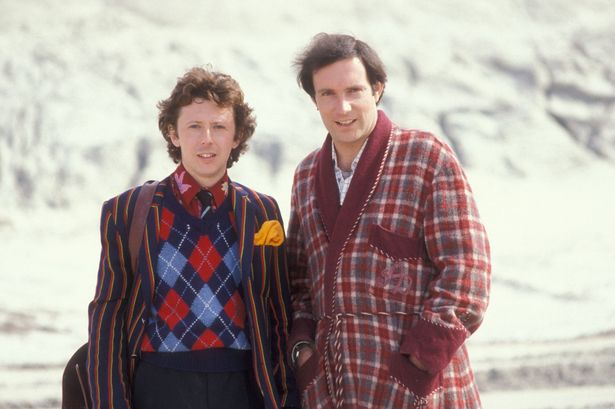 Atheistic towel-toting geeks in space.
Atheistic towel-toting geeks in space.

Reader Comments